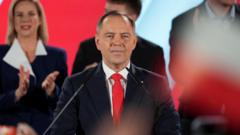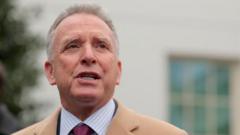Following US President Donald Trump's announcement of possible tariffs on EU imports, the European Union's trade commissioner has called for negotiations rooted in respect. European leaders stress that escalating tariffs could harm both parties economically, reinforcing the message that continued dialogue is crucial for a sustainable trade relationship.
Tensions Rise as Trump Threatens 50% Tariffs on EU Imports

Tensions Rise as Trump Threatens 50% Tariffs on EU Imports
The EU's trade chief emphasizes the need for mutual respect in trade negotiations amid Trump’s tariff threats, raising concerns over economic implications.
The European Union (EU) has responded firmly to US President Donald Trump's recent threats to impose a 50% tariff on all goods imported from Europe. The EU’s Trade Commissioner Maros Sefcovic emphasized that the 27-member bloc seeks to negotiate based on "respect" rather than "threats". This statement came on the heels of Trump's expression of frustration over the slow pace of ongoing trade talks, during which he unilaterally declared a desire to raise tariffs starting June 1.
Sefcovic, following a conversation with US Trade Representative Jamieson Greer and Commerce Secretary Howard Lutnick, reiterated the EU's commitment to an equitable trade deal. "EU-US trade is unmatched & must be guided by mutual respect, not threats," he asserted, emphasizing that the EU stands ready to protect its interests.
On Trump's Truth Social platform, he lamented the stagnation of discussions with Europe, indicating frustration and a readiness to set tariffs if negotiations do not progress. Trump speculated that he might be more amenable to delaying the tariffs if significant investments from European companies into the US materialized.
Trade statistics underscore the significance of the EU as a trading partner for the US, with exports surpassing $600 billion last year. Importantly, the trade deficit has troubled Trump, who believes policies in Europe adversely affect American businesses, particularly in the automotive and agricultural sectors.
European leaders have responded to Trump's tariff comments with caution. Ireland's Prime Minister Micheál Martin voiced concern, suggesting that a tariff escalation is unnecessary and reaffirming that negotiation is the most prudent path forward. French Foreign Minister Laurent Saint-Martin underscored the need for de-escalation, while Germany's Economy Minister Katherina Reiche insisted on achieving a negotiated solution.
Past experiences with tariffs have shown volatility in trade relations, and the current situation has already impacted stock markets in both the US and Europe, with significant declines reported in major indices following Trump's remarks.
In the backdrop of these developments, Trump's prior announcements of a 20% tariff and subsequent halving to 10% reflect his administration's ongoing conflict-based approach to international trade relations. With concerns amplified regarding imports from technology firms, including a specific mention of Apple, Trump's stance could further strain the US-EU economic partnership. The dialogue continues as both sides reevaluate their positions in this fraught trade landscape.






















